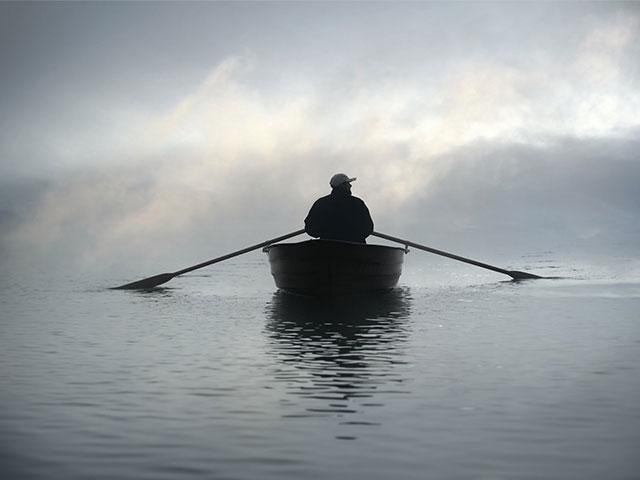Rowboat from Renmark to Mildura

This article originally
appeared in the "Riverlander" March 1958.
The author, Therese Hocking (now deceased), did the trip with her parents in
the depression years, when work and money were very scarce. It shows the
determination of the hardy souls in those times.
It was published in a magazine that promoted Murray River and associated articles of interest in those days, with an objective (as was the common theme of the Menzies fifties) of presenting a “homely image” of the family and times…along with so many cover-ups of the damaged returned soldiers from the 2nd World War. So there is a certain amount of edited out realities not presented in the original anecdote …How do I know of such things?..because the author was my mother.
Row-Boat from Renmark to Mildura.
By Therese Hocking.
Have you ever thought of travelling by river? Not in a comfortable steamer, but in an open boat. My father and mother, my sister and I, tried it some years ago when we did the trip from Renmark to Mildura and back.
Our two-roomed canvas cottage that stood on blocks was exchanged for a rowing boat and a white tent. We rolled the latter, stowing it with only what was necessary, including a fortnight's groceries, into the boat and left early one morning.
It was my job to mind my little sister, while mother and father, seated side by side, rowed the boat. Unfortunately "Mary" developed a love for watching things zig-zag down through the water out of sight. I am unable to remember how many odds and ends we lost this way until she tired of it. We then began to count the scarred trees out of which the aborigines had cut their canoes. On the lonely stretches of the river there often were many.
Posts for the tent were cut whenever we decided it was too chilly to sleep under the stars, or if we stayed a few days to fish or set rabbit traps. In fact, we travelled 'Wagga's way', as we came to call it; because he was the only other person we met using a rowing boat for that purpose.
Wagga was the first, but one of the many characters we happened to meet. A big man, straight, in spite of sixty years, He had a huge, rounded beard as black as midnight. So was his big cat "Satan", who sat on the prow of his master's rowing boat and was the most 'human' cat I have ever met. Wagga always pushed, facing the front to row his boat, as he "liked to see the way”, He was a super-cook and used the native way to cook fish or wild game, straight from line or gun, wrapped in clay and placed amongst glowing coals: When cooked the feathers stripped off with the clay.
We first met him one evening when he rowed across the river to warn us that the side where we intended to camp was haunted. The story was that a woman passenger on one of the paddle steamers had wandered off while the crew were cutting logs for the boiler fires. She was never found. Her spirit, we were told, used to come back to that part of the river looking for the boat.
Mother is Irish, so we did not stay to find out the truth, but quickly crossed to the other side. It was here next day that a huge ram frightened us. Father and Wagga went off shooting and We other three sat on a fallen gum tree to drink in the surroundings. Suddenly mother's sixth sense caused her to look round and there, not more than three yards behind, stood the ram. His curled horns looked really dreadful. We hastily and quietly withdrew to the boat and continued enjoying peace and wild beauty from there.
Between towns we met several families who had settled on the banks of the river. One that astonished us was the goat farm people. They were a big family and owned goats of every kind, size, sex and colour. They ate goats, milked them and used home-tanned skins for rugs and mats. We were welcomed like old friends. A huge meal was prepared for all and we thoroughly enjoyed it. I have often wondered how they never grew tired of goats, goats, goats.
Sometimes we never met anyone for days; there was just the never-ending scrub and the gurgling of the Murray River. Then, round a bend, a home stead would come suddenly into view. The people of the homesteads were mostly kind, giving us meat and often flour. In return father would solder their leaking kettles and things.
There was only one accident.Mary, running down to the water's edge to watch a paddle steamer, cut her foot badly. We came to a homestead next day and the people there re-bandaged it. Not a scar was left.
We reached Mildura four days
before Christmas, pitched our tent opposite the town and decided to stay a few
days.
The next couple of mornings father spent in the township, trying to get
soldering or other work. We others washed and cleaned everything, giving the
camp oven a good scrub with the clean, white sand found at the water's edge.
Christmas was spent quietly, it was cool under the giant gums. Then it was
decided we would go back to Renmark. In Renmark the fruit picking season was
about to start and father had been promised some work. So we started back. It
took six weeks to come up, and a fortnight to get back.
Comments
Post a Comment